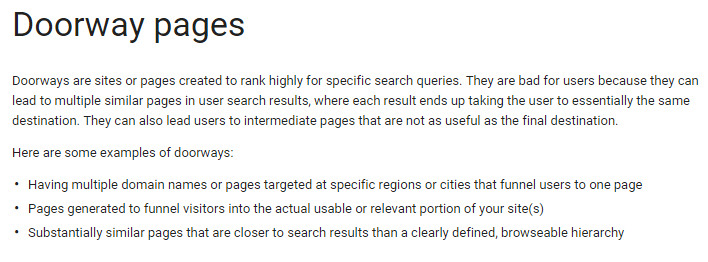Google are continually making changes to its search ranking algorithm to improve the quality of returned results and improve the user experience.
One of its latest algorithm updates is the “doorway pages update“, which is aimed at eliminating webspam. Are you aware of the purpose and impact of this update?
Google are quick to inform us that “sites with large and well-established doorway campaigns might see a broad impact from this change”.
[Tweet “What is a doorway page, and how might they spell disaster for your website?”]In this article, we’ll look at what doorway pages are, how they may harm your search ranking results, and what you can do to avoid potential Google penalties.
What is a Doorway Page?
Doorway pages are web pages that only exist to rank well for particular keyword phrases in search engine results pages (SERPs), and they provide little value to the searcher.
This is usually an attempt by a webmaster to create a large footprint in the search engines, offering up more doorways into their website but to usually the same or similar destination.
Google’s blog states: “They are bad for users because they can lead to multiple similar pages in user search results, where each result ends up taking the user to essentially the same destination”.
Related: How to avoid black hat SEO
 Google’s definition of a doorway page
Google’s definition of a doorway page
Examples of Doorway Pages
It’s important to be able to distinguish a doorway page from a regular landing page. Think of doorway pages as multiple landing pages all leading to the same product / end goal.
Here are a few examples of what might be considered a doorway page.
- Multiple pages with only slight variations in their content that are indexed individually
- Pages with lots of keyword variations, links, and ads that only exist to direct users to other web pages
- Separate domain names that target specific geographical locations and reroute visitors to a single page
- Multiple sites that direct users to the same content, used by franchises or service sites
Google’s Algorithm Update is Likely to Affect Ecommerce Sites
Google recommends that you ask yourself a few key questions to determine if a page is a doorway page or not:
- Is the page’s purpose to gain higher search engine rankings or to improve the user experience?
- Is the content optimised for generic keyword phrases, when the content is actually very specific?
- Are the pages difficult or impossible to navigate to from other areas of the site?
- Are links created solely for the purpose of gaining higher search rankings?
- Do multiple pages repeat locations and product lists?
The final bullet point is important to note for ecommerce sites, as Google is cracking down on sites trying to gain higher rankings by creating microsites with different URLs or duplicate pages that simply repeat the same information.
Are Location-Specific Landing Pages Doorway Pages?
If you have multiple landing pages for different locations / geographical areas, it’s likely they’re going to contain similar information.
Instead of trying to capture search traffic by having similar pages for every location you serve, consider having only one main landing page. You can include details about business locations or areas you cover within that landing page.
Google is smart, they understand that someone searching for a “web design company in Stevenage” is looking for a company based in Stevenage and not a company based in the next county over that tries to target “Stevenage” in its keyword strategy.
Related: How to fail at SEO in 5 steps
Are Landing Pages Doorway Pages?
If you’ve created a landing page to capture specific leads, for example from a pay-per-click campaign, the page is probably optimised for specific keyword phrases and may not be accessible from your site’s main navigational menu.
In this case, you should ideally label these pages with a no-index tag, so they aren’t included in Google’s search results.
For more information on the index check out our SEO guide.
How to Avoid Being Penalised
If you’re still at risk from having your pages demoted in search rankings because of doorway pages, here are some simple steps you can take:
If there are pages that overlap in their content, combine them into one helpful, user-focused page and 301 redirect the other pages to that page
Avoid duplicate content. Google does not like sites with multiple pages of similar content, such as different pages focused on one location targeting different keyphrases. Instead, create unique content featuring user reviews and specific information that appeals to users in each location
Only add new pages if you’re providing unique value to your visitors
Avoid hard-to-find pages. Make sure users can navigate easily from one page to another
Avoid having multiple websites just to increase rankings for certain search terms. If the services or products differ substantially on each domain, you shouldn’t have any problems.
But if you’re a plumber, for example, with separate domains for different locations, you’re at risk from a Google penalty, especially if you use the same contact information on each site
Make sure keywords relate specifically to the page content. Instead of trying to rank for broader key phrases, optimise your pages with specific long-tail keywords to avoid being penalised. This is actually better for driving more qualified traffic to your site
In Summary
Ultimately, each page on a website should answer a specific question, and appear to be naturally created for humans, not just written with search engines in mind.
Every webmaster and marketer should be following these suggestions, regardless of the “doorway update”, as they are all related to other SEO best practices.
In the future, focus on creating unique content aimed at improving the user experience and you’re more likely to avoid any Google penalties and improve your search rankings in the long run.
Your Say!
Worried you might be using doorway pages on your site but not sure? Drop us a comment below and we’ll do our best to help.
